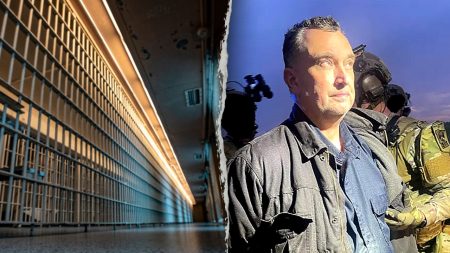Joseph Corcoran’s Impending Execution: A Quarter-Century Journey to Death Row
Joseph Corcoran, a 49-year-old Indiana inmate, is scheduled to be executed on December 18, 2023, marking the state’s first execution in 15 years. Convicted in 1999 for the 1997 murders of his brother and three other men, Corcoran’s case resurfaces long-standing debates about capital punishment, lethal injection protocols, and the role of mental illness in the justice system. The backdrop of this impending execution is Indiana’s struggle to obtain lethal injection drugs, highlighting a nationwide issue fueled by pharmaceutical companies’ reluctance to participate in capital punishment. This has forced states to seek alternative sources and formulations, raising concerns about the potential for botched executions and unnecessary suffering.
Corcoran’s crimes stem from a disturbing incident on July 26, 1997, when he fatally shot his 30-year-old brother, James Corcoran, along with Douglas Stillwell, Timothy Bricker, and Robert Turner, all also 30 years old, except Turner who was 32. Court records reveal Corcoran was under immense stress due to his impending move from the family home following his sister’s marriage to Robert Turner. He allegedly overheard his brother and the others discussing him, leading him to load his rifle and shoot all four men. Adding a layer of complexity to the case is Corcoran’s previous acquittal for the 1992 killings of his parents, despite reported boasts about the act while incarcerated. This history raises unresolved questions about his past and potential underlying motivations.
Kelly Ernst, Corcoran’s sister and a victim in the 1997 shootings, having lost both her brother and fiancé, finds herself in a uniquely agonizing position. While declining to comment on Corcoran’s alleged involvement in their parents’ deaths, Ernst has expressed her opposition to the death penalty, believing it offers no closure or meaningful resolution. She has also voiced concerns about her brother’s mental health, suggesting he suffers from a serious mental illness. Ernst’s perspective adds a poignant human dimension to the case, highlighting the devastating ripple effects of violent crime and the complexities of grief and forgiveness. Her absence at the execution underscores the profound personal toll these events have taken.
Indiana’s hiatus from executions since 2009 is largely attributed to the nationwide shortage of lethal injection drugs. Pharmaceutical companies, particularly in Europe, have increasingly refused to provide drugs for executions, citing ethical concerns. This has forced states like Indiana to rely on compounding pharmacies, which custom-manufacture drugs. Indiana’s chosen drug, pentobarbital, has come under scrutiny for its potential to cause excruciating pain if not administered properly, further fueling the debate about the humanity of lethal injection. The secrecy surrounding the source of these drugs adds another layer of controversy, preventing public scrutiny of their origin and quality control.
The execution process in Indiana is governed by strict protocols, outlining who can be present and the roles they play. The prison warden, execution team, physicians, spiritual advisors, and a limited number of victim’s and condemned’s family members are permitted to witness the execution. Notably, Indiana, along with Wyoming, prohibits media witnesses, restricting public access to information about the execution process and raising concerns about transparency and accountability. This lack of media access prevents independent observation of the execution procedure, potentially hindering public understanding and impeding any scrutiny of the state’s adherence to established protocols.
Corcoran’s legal appeals have been exhausted, with the Indiana Supreme Court denying his requests to halt the execution and assess his competency. In a handwritten affidavit, Corcoran accepted his guilt and stated he no longer wished to pursue legal action. However, his attorneys, arguing he suffers from severe paranoid schizophrenia with auditory hallucinations and delusions, filed a last-minute petition in federal court. They contend that Corcoran’s desire for execution is driven by his mental illness, believing it will end his perceived torment. This raises critical questions about whether executing someone with such a severe mental illness constitutes cruel and unusual punishment, a violation of constitutional rights. The court’s decision will have significant implications for future cases involving mental competency and the death penalty. The possibility of Governor Holcomb commuting Corcoran’s sentence remains, although he has previously stated his intention to let the legal process unfold. This adds a final layer of uncertainty to the outcome, with the Governor’s decision potentially being the last recourse for preventing the execution.











